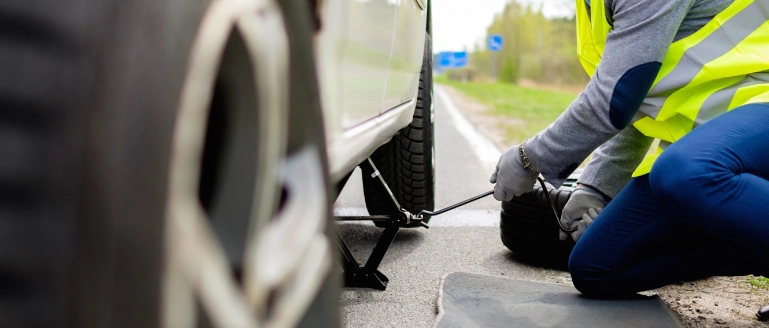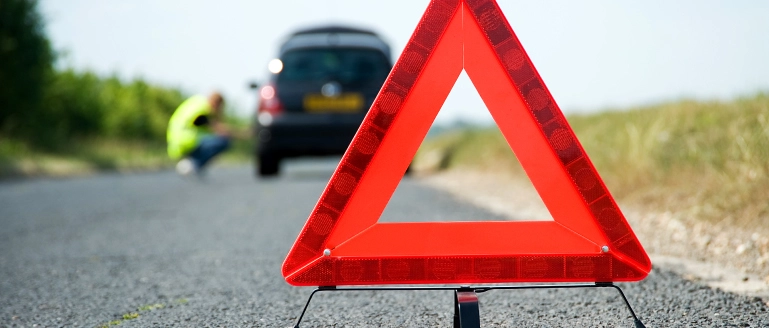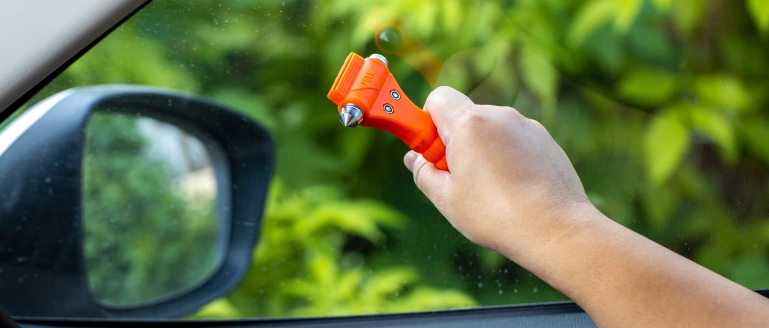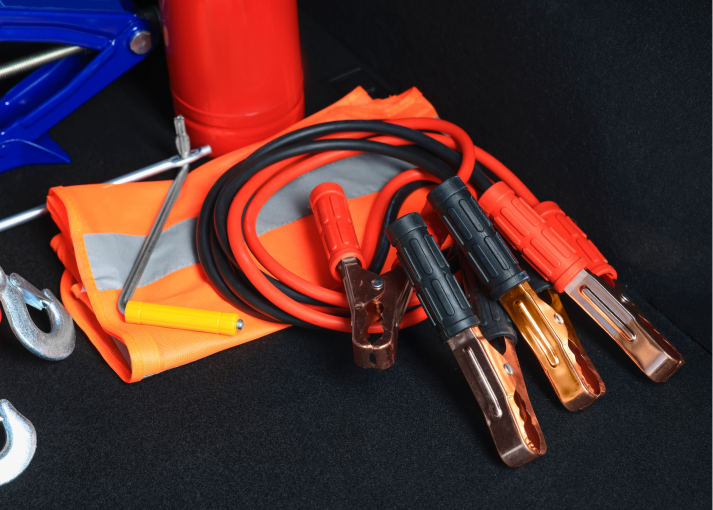Be Prepared: Building Your Roadside Essentials Kit
According to the Department for Transport, 332 billion vehicle miles were travelled across the UK as of June 2023. No matter how long your journey, it’s important to be well prepared.
An essentials kit will provide immediate help in unexpected roadside situations and should include things like a first aid kit, a hi-vis kit, and basic tools.
What to include in your essentials kit
It is better to always have a kit and never use it than go without one when you need it.
Having an emergency essentials kit in your vehicle is a proactive step in preparing yourself for situations like accidents, breakdowns and unpredictable weather conditions. You should include:
A first aid kit
Your kit should include things like:
- Pain relief
- Plasters
- Bandages
- First aid and emergency booklet
- Scissors
- Anti-septic
- Personal medication
Top Tip: Check your first aid kit regularly, and make sure it is fully stocked with all the supplies you need. Don’t forget that some items in first aid kits can expire, and should be replaced after the expiry date.
St John Ambulance offers a selection of pre-packaged car first aid kits.
You can view the Department for Transport’s guide for applying first aid at the roadside, here.
A first-aid kit will help you treat minor injuries at the roadside after an accident until emergency services arrive. You should make sure everyone is safe as soon as possible after an accident.
You can read more about the steps you need to take after a car accident, here.
A spare tyre, car jack and wheel brace
Make sure that you have a spare tyre, a car jack and a wheel brace in case you ever need to change a tyre.
Driving on a flat tyre is dangerous - so having the tools to change the tyre yourself can reduce the risk of an accident.
Top Tip: It is useful to know if you have run flat tyres, as they will allow you drive a short distance even after a puncture, allowing you to get to a repair garage.


Jump leads
Including jump leads in your essentials kit is beneficial, as they allow you to jump-start your car if the battery unexpectedly runs out.
With jump leads and the help of another vehicle's working battery, you can get your car running again.
To learn how to jump start a vehicle, the AA’s simple 9 step guide can help.
Warning triangles
Warning triangles are reflective signs meant to alert other drivers to potential hazards on the road. They indicate there has been an incident and that your vehicle is unable to move.
Warning triangles also make it easier for other drivers and the emergency services to spot you and any passengers you might have at the roadside.
While it isn’t compulsory to have a warning triangle in the UK, it is recommended.


A wind up torch
Making sure you can light up your surroundings is useful if you’re in an accident at night or somewhere with poor visibility.
Most mobile devices have a flashlight, but it’s still a good idea to carry a wind-up torch in your kit in case your phone battery runs out.
You can find more tips about how to stay safe while driving at night, here.
A mobile phone charger
Always charge your phone before a journey in case you need to call for help after an unexpected incident.
Keeping a portable charger pack or an adapter for your vehicle’s cigarette lighter can help you to stay connected.
Food and water
Before you start a journey, you should make sure you have plenty of water and long-lasting snacks.
You should always keep your energy up while making long trips, but these supplies will also come in handy if you’re stuck at the scene of an accident for a long period of time.
Warm clothes and blankets
Warm, hi-vis clothes and blankets can help you to stay warm at the roadside after an accident or breakdown - especially in winter months.
Blankets are also useful as sun shades for the windscreen in summer, keeping you cool if you’re left to wait for assistance.
Speak to a Non-Fault Claim Specialist
We manage everything on your behalf, ensuring that the claims process is as smooth and stress-free as possible.
Back to the top >

Other Useful Items
There are also other useful items that could be part of your emergency kit.
Take the time to think about the various scenarios you might encounter and include items accordingly.
Sunglasses
Including a pair of driving sunglasses in your emergency kit is a good idea to help you reduce the chance of you getting distracted by the sun’s glare.
Not all sunglasses are suitable for driving. Some glasses can impair road visibility, so it’s important to find sunglasses that are safe to drive in.
Road map
Paper maps are useful to help establish exactly where you are when your phone/GPS isn’t charged or is without signal.
It can also be used to look for nearby areas in case you are stranded somewhere remote and need to get help.
Vehicle manual
Having your owner’s manual on hand means that all of the important information about your car is readily available.
Knowing how your car operates is useful for troubleshooting any unexpected problems.
Seatbelt cutter
A seatbelt cutter can help you to free yourself from your vehicle if you’re trapped after an accident.
They can cut seatbelts and often come with a sharp point on the handle, to help break windows. Ensure seatbelt cutters are stored securely and away from children, as they are sharp tools.


Empty fuel can
Keeping an empty fuel can can be handy, especially if you need to walk to a nearby petrol station to refill if your vehicle runs out of fuel.
De-icer and scraper
Having a can of de-icer and a scraper in your car should be an essential in winter months.
Your mirrors and windows should all be free of snow and ice, and it is important that you properly clear your windscreen before setting off. You could be breaking the law if you do not.
Basic tools
Having a range of basic tools in your vehicle for emergencies can prove to be useful for a variety of reasons. Some other tools include:
- Puncture repair kit
- Portable car battery
- Collapsible shovel for mud and snow
- Tyre pump
- Multi-tool
- Tape and zip ties
- Portable tyre pressure gauge
Your Accident Management Company
Hopefully you’ll never be in a situation where you need to use your essentials kit, but sometimes accidents happen. If you’ve been in a non-fault road traffic accident, Auto Claims Assist is on hand to help you with premium accident management services and non-fault claims management.
Call our new claims team on 0330 128 1407 | Start your claim now >


Auto Claims Assist
First contact after a car accident
Start my claim online Call us on 0330 128 1407